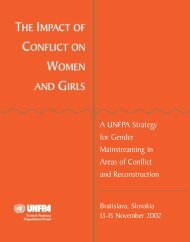Sexual exploitation and abuse by UN peacekeepers - PeaceWomen
Sexual exploitation and abuse by UN peacekeepers - PeaceWomen
Sexual exploitation and abuse by UN peacekeepers - PeaceWomen
Create successful ePaper yourself
Turn your PDF publications into a flip-book with our unique Google optimized e-Paper software.
10<br />
Carlyn van der Mark<br />
Political Science Master Thesis - <strong>Sexual</strong> <strong>exploitation</strong> <strong>and</strong> <strong>UN</strong> <strong>peacekeepers</strong><br />
2006). The lack of accountability can also result in the <strong>abuse</strong> of power. U.N <strong>peacekeepers</strong> are<br />
rarely held accountable for their actions because of technical difficulties in obtaining<br />
evidence or criminal allegations against the <strong>peacekeepers</strong> (Allred, 2006).<br />
However, other scholars have argued that the <strong>UN</strong> does not want to be held accountable for<br />
allegations of sexual <strong>exploitation</strong> <strong>and</strong> <strong>abuse</strong> (Raven-Roberts, 2005). There has been a<br />
continuation of reports of misconduct <strong>by</strong> U.N <strong>peacekeepers</strong> that the U.N prefers to<br />
acknowledge internally (SOURCEIT). The peacekeeping mission in Bosnia <strong>and</strong> Herzegovina<br />
was celebrated <strong>by</strong> the U.N <strong>and</strong> preferred not to acknowledge the sexual <strong>exploitation</strong> <strong>and</strong><br />
<strong>abuse</strong> that occurred simultaneously throughout the mission (v<strong>and</strong>enburg, 2005). The failure<br />
of the policy is a result of the U.N not wanting to address allegations of sexual <strong>exploitation</strong><br />
<strong>and</strong> <strong>abuse</strong> because of the negative impact it has on the organization (v<strong>and</strong>enburg, 2005).<br />
Failure of gender mainstreaming the 1325 resolution<br />
The United Nations Security Council resolution 1325 in 2000 has been referred to as the<br />
„mantra‟ in gender mainstreaming policies (Carey, 2007, p.2). SC 1325 was the first time the<br />
Security Council regarded the importance of women‟s experiences in conflict <strong>and</strong> post<br />
conflict situations. The purpose of the resolution was to outline actions that were to be taken<br />
<strong>by</strong> the U.N <strong>and</strong> member states to incorporate a gender mainstreaming policy in peace <strong>and</strong><br />
security policies (Cohn, Kinsella, Gibbings, 2010, p.2). The principles of gender<br />
mainstreaming apply to women‟s rights <strong>and</strong> humanitarian needs with regard to the<br />
implementation of U.N peacekeeping missions (Carey, 2007, p.2). The incorporation of a<br />
gender perspective is important towards the prevention of sexual <strong>exploitation</strong> <strong>and</strong> <strong>abuse</strong><br />
because it reinforces a zero tolerance towards violence against women (Cary, 2007, p.4). The<br />
failure of the zero tolerance policy is attributed to the failure of implementing SC 1325<br />
(Lytikainen, 2000, Cohn C, Kinsella H, Gibbings, 2004).<br />
Vayrynen criticizes the mainstream of gender as being a confine of modernity (2004).<br />
Vayrynen <strong>and</strong> Hudson perceive the importance of recognizing contextual differences in<br />
implementing gender mainstreaming policies. Vayrynen argues that the U.N discourse on<br />
gender creates binary opposites in thinking about gender. Women are perceived through<br />
private <strong>and</strong> peaceful terms <strong>and</strong> men as public <strong>and</strong> war-like (Vayrynen, 2004, p.2). Hudson<br />
recognizes this same critical approach in mainstreaming gender issues <strong>by</strong> arguing that<br />
contextual analysis is significant when incorporating a gender perspective. Incorporating




![IANSA [PDF, 2MB] - PeaceWomen](https://img.yumpu.com/25206379/1/190x123/iansa-pdf-2mb-peacewomen.jpg?quality=85)
![Commitments Sample [PDF, 93KB] - PeaceWomen](https://img.yumpu.com/25206331/1/190x245/commitments-sample-pdf-93kb-peacewomen.jpg?quality=85)










![A Toolkit for Advocacy and Action [PDF, 260KB] - Peace Women](https://img.yumpu.com/25205989/1/190x245/a-toolkit-for-advocacy-and-action-pdf-260kb-peace-women.jpg?quality=85)